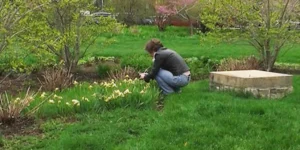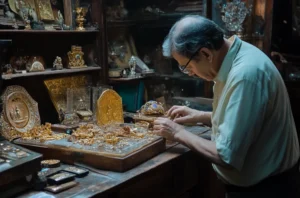
Stepping onto our new porch, I felt a mix of relief and unease. The suburb’s silence was almost eerie. Mark and I had left the city for a fresh start, but the old house next door, with its mysterious owner Mrs. Harper, hinted at secrets we hadn’t anticipated.
Mrs. Harper, an elderly woman, had sold us the house. Her wary glance from behind her screen door had been our first clue. Mark was intrigued.
“Did you hear her husband died under strange circumstances?” Mark asked over dinner.
“Probably gossip,” I replied, focusing on my pancakes. “Small towns exaggerate.”
“But there’s something off about her. Have you noticed the way she watches us?”
I had, but didn’t want to admit it. I shrugged it off, burying myself in work, despite feeling her eyes on me every time I passed her house.
Then came the day everything changed. Home sick with a headache, I was curled up on the couch when Max, our dog, began growling. I looked up to see Mrs. Harper sneaking through our yard with a small shovel. She was digging near the old oak tree.
Confused, I stormed outside. “Mrs. Harper! What are you doing?”
She froze, her face pale. “I-I wasn’t…” she stammered, glancing at the hole she’d dug.
“What are you digging up?” I demanded.

A museum appraiser at work | Source: Midjourney
She hesitated, then pulled out a small, weathered bag filled with gleaming gold and diamonds. The items, caked in mud but unmistakably valuable, looked like museum relics.
Mrs. Harper’s hands trembled. “My husband found these years ago with his metal detector. He thought it was a priceless ancient treasure.”
She continued, “He became paranoid when treasure hunters started sniffing around. He hid the treasure here, but the fear never left him. It eventually took him from me.”
My heart ached. “I’m so sorry, Mrs. Harper.”
She gave a sad smile. “I’ve lived in fear ever since. Every day, I wondered if someone would come for it.”
“You can’t keep living like this,” I said. “No wealth is worth constant fear.”
She sighed deeply. “But what if I give it away? What was it all for?”
“You should donate it,” I suggested. “To a museum or something. Let it be someone else’s burden.”
She nodded, resigned. “You’re right. I need to let it go.”
A few days later, we visited the local museum with the appraiser. Mrs. Harper was nervous. The appraiser examined the items and said, “I have surprising news. These aren’t what they seem. The gold is a worthless alloy, and the diamonds are just glass.”
I blinked, then started laughing. Mrs. Harper joined in, and we laughed until we could barely breathe. The appraiser watched, puzzled.
All those years of fear over a worthless hoax. It was absurd, but it felt liberating.
As we left the museum, Mrs. Harper’s eyes twinkled. “Thank you, April, for everything.”
I smiled, feeling warmth. “Let’s share that bottle of wine I’ve been saving. I think we’ve earned it.”





